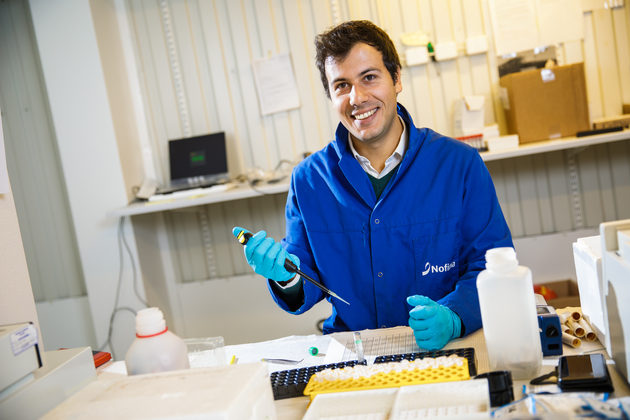RASHealth
Water treatment in RAS systems

Water disinfection strategies to improve Atlantic salmon parr production in freshwater recirculating aquaculture systems
Start
15. Jan 2020
End
31. Dec 2023
Funded by
The Research Council of Norway
Cooperation
NTNU - Norwegian University of Science and Technology and National Institute of Aquatic Resources - DTU Aqua, Denmark
Project Manager(s):
Other Participants:
Carlo C. Lazado
Mette Serine W Breiland
Hilde Toften
Anne-May Johansen
A major technological shift in a 344 million annual production of Atlantic salmon is occurring in Norway.
Land-based flow through systems is being replaced by recirculating aquaculture systems (RAS). These sophisticated systems have a low water usage, no fish escapees, and a controlled production environment which is optimal for fish production.
RAS consist of a series of water treatment units, including a biofilter to treat the water and reuse it. However, the innovative nature of RAS poses a new challenge on how to disinfect the water without producing an adverse impact on the salmon’s health and welfare, and biofilter performance. Further information on how to implement a more efficient and operational disinfection strategy has been and still are needed.
There are several strategies which could potentially be used for water treatment in RAS, but their impact on fish health, welfare and growth needs to be documented before applying them to an industrial scale. Likewise, the equilibrium between keeping unwanted bacteria and virus levels low and functional bacteria in the biofilter requires the development of an operational method to monitor the biofilm activity.
Our RASHealth results:
• We succeeded in improving water treatment methods using ozone (O3) and peracetic acid (PAA).
• Biosecurity is increased by adopting disinfection strategies that consider the disease vectors and reservoirs of pathogens.
• The PAA’s effect on Atlantic salmon health, welfare and growth, and to evaluate two different methods has been documented.
• We developed and tested a new quantification method for biofilm activity during daily operations.
The project has contributed to the standardisation of water disinfection with an impact on the future design and performance of RAS. Ultimately, RASHealth will directly contribute to the sustainability of Norwegian aquaculture by developing a food production system that efficiently produces nutritious food with reduced environmental impacts.